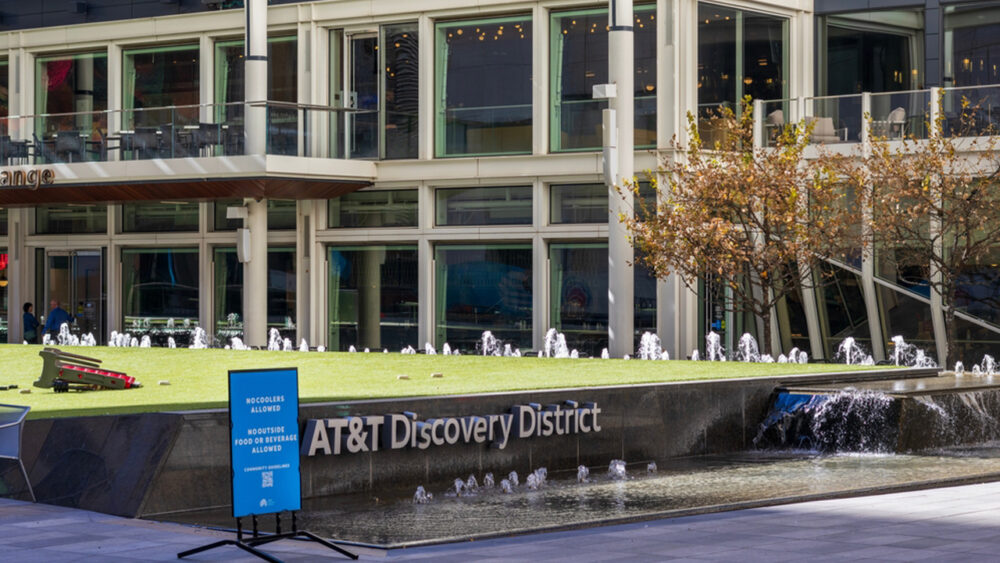AT&T has quietly expanded its foreign workforce while securing a multimillion-dollar federal contract intended to bolster U.S. national security infrastructure.
The U.S. Department of Homeland Security awarded AT&T a 10-year, $146 million contract last year to maintain and expand emergency communications systems such as the Government Emergency Telecommunications Service and Wireless Priority Service, according to a September 2024 company press release. The award extends AT&T’s long-running partnership with DHS into next-generation 5G networks.
At the same time, federal immigration data shows the telecom giant has continued to rely on foreign labor. According to the U.S. Citizenship and Immigration Services (USCIS) H-1B Data Hub, 388 H-1B workers were approved at AT&T between January 1, 2024, and the first six months of 2025.
This comes at a moment when American workers at the company have suffered layoffs and are reportedly faced with the possibility of more in the future.
The privately operated H-1B Salary Database, which tracks Labor Condition Applications (LCAs) filed with the U.S. Department of Labor, shows AT&T filed 741 H-1B applications between April 2024 and mid-2025. These filings covered positions in Plano and Dallas, Texas, and Alpharetta, Georgia, with a range from $101,760 to $500,000.
While these numbers are within competitive industry ranges, some discrepancies appear between the federal filings and AT&T’s own public job postings.
A LinkedIn post archived from 2025 lists AT&T’s Lead Software Engineering positions with pay between $135,000 and $215,000, roughly matching the median H-1B filings for similar roles.
However, a current posting on AT&T’s own website for a Lead System Engineering position in Plano offers a salary between $163,000 and $215,800, which stands notably higher than several recent H-1B filings for comparable system engineering jobs in the same city — many of which were logged in 2024 at $145,000 to $155,000.
The data suggests AT&T may be paying foreign hires slightly below what its website advertises for equivalent positions, although both figures remain within federal compliance ranges.
The controversy comes as AT&T faces renewed scrutiny in Dallas over its long-term commitment to the city it once called home. As The Dallas Express previously reported, the company has refused to clarify whether it plans to remain in its downtown headquarters, echoing the same silence that preceded its abrupt 2008 departure from San Antonio. That move blindsided civic leaders there, and Dallas officials now fear a repeat as AT&T executives quietly tour suburban campuses.
Against that backdrop, the company’s growing reliance on foreign labor while receiving lucrative federal contracts raises questions about corporate loyalty — not only to its workers, but to the communities that helped build its brand.
This hiring pattern mirrors a broader trend among major corporations balancing government contracts, layoffs, and foreign labor utilization. Earlier reporting by The Dallas Express highlighted how Texas Instruments, another Dallas-area technology firm, received up to $1.61 billion in federal CHIPS Act funding while laying off Americans and maintaining heavy reliance on H-1B workers.
The H-1B program allows U.S. employers to temporarily hire foreign workers in specialty occupations, usually requiring at least a bachelor’s degree. In most cases, there is no legal requirement for companies to first try to hire an American before seeking an H-1B worker, although the program is frequently framed as being intended to fill “gaps” in the American labor market. About 72% of H-1B visas go to Indian nationals and 12% to Chinese nationals, USCIS reports.
The Trump administration has proposed a rule that could overhaul the visa selection system by prioritizing higher-paying job offers over the current random lottery model. The proposal, titled “Weighted Selection Process for Registrants and Petitioners Seeking to File Cap-Subject H-1B Petitions,” was published for public comment through November 24, 2025, under docket number USCIS-2025-0040.
Public opinion remains sharply divided. Fifty-six percent of U.S. citizens believe H-1B visa holders create “unfair competition” and take jobs from Americans, a survey previously reported by DX found. The Blind poll of more than 4,000 professionals revealed that while most foreign-born workers support the program, fewer than half of U.S. citizens do.
Labor unions have echoed concerns that employers exploit the system to suppress wages. The AFL-CIO’s Department of Professional Employees said in a 2025 fact sheet, “The H-1B visa program must be reformed so that employers can no longer use the program to lower industry standards, engage in outsourcing and offshoring, and pay H-1B workers below market wages.”
Not all analysts agree. The libertarian Cato Institute has argued in a paper that “H-1B workers are highly paid: their wages are in the 90th percentile of all wages in the United States,” noting that the median H-1B salary — around $108,000 — exceeds the national median wage more than twofold.
As AT&T continues to expand its government portfolio — and its foreign hiring footprint — questions remain about whether the company’s growth strategy aligns with public sentiment and national policy goals.
AT&T was contacted for comment in the production of this story but did not respond, continuing a pattern of silence toward The Dallas Express and growing uncertainty about its long-term commitment to Dallas.


